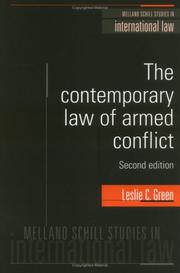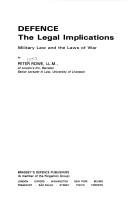| Listing 1 - 10 of 119 | << page >> |
Sort by
|
Book
Year: 1998 Publisher: [s.l.] : Ministere de la Defense,
Abstract | Keywords | Export | Availability | Bookmark
 Loading...
Loading...Choose an application
- Reference Manager
- EndNote
- RefWorks (Direct export to RefWorks)

ISBN: 0719056004 Year: 2000 Publisher: Manchester : Manchester University Press,
Abstract | Keywords | Export | Availability | Bookmark
 Loading...
Loading...Choose an application
- Reference Manager
- EndNote
- RefWorks (Direct export to RefWorks)
Book
ISBN: 0379208156 Year: 1986 Publisher: London : Oceana Publications,
Abstract | Keywords | Export | Availability | Bookmark
 Loading...
Loading...Choose an application
- Reference Manager
- EndNote
- RefWorks (Direct export to RefWorks)
Book
Year: 1998 Publisher: Newport, RI : Naval War College Press,
Abstract | Keywords | Export | Availability | Bookmark
 Loading...
Loading...Choose an application
- Reference Manager
- EndNote
- RefWorks (Direct export to RefWorks)
Book
ISBN: 1843543389 Year: 2005 Publisher: London : Atlantic Books,
Abstract | Keywords | Export | Availability | Bookmark
 Loading...
Loading...Choose an application
- Reference Manager
- EndNote
- RefWorks (Direct export to RefWorks)
Book
ISBN: 9780190263577 Year: 2016
Abstract | Keywords | Export | Availability | Bookmark
 Loading...
Loading...Choose an application
- Reference Manager
- EndNote
- RefWorks (Direct export to RefWorks)
International military interventions can be extremely costly in terms of monetary resources, logistical challenges, and possible soldier and civilian casualties, as well as the potential for catastrophic results to international relations and agreements. In one such example of these enormous potential costs, the US and UK wished to stop a Russian ship from delivering ammunition to the Assad regime in Syria in 2012. Intercepting or confronting a Russian ship in transit could have erupted into open conflict, so they sought an alternative, non-confrontational maneuver : instead of military intervention, the UK persuaded the ship's insurer, London's Standard Club, to withdraw the ship's insurance. This loss of insurance caused the ship to return to Russia, thus avoiding an international clash as well as the delivery of deadly weapons to Syria. This use of legal maneuvering in lieu of armed force is known as 'lawfare' and is becoming a critical strategic platform. The author draws on his experiences as a lawfare practitioner, US State Department attorney, and international law scholar in analyzing the theory and practice of the strategic leveraging of law as an increasingly powerful and effective weapon in the current global security landscape. Lawfare incorporates case studies of recent offensive and defensive lawfare by the United States, Iran, China, and by both sides of the Israeli-Palestinian conflict and includes dozens of examples of how lawfare has thus been waged and defended against. The author notes that since private attorneys can play important and decisive roles in their nations' national security plans through their expertise in areas like financial law, maritime insurance law, cyber law, and telecommunications law, the full scope of lawfare's impact and possibilities are just starting to be understood. With international security becoming an ever complicated minefield of concerns and complications, understanding this alternative to armed force has never been more important.
Book
Year: 2017 Publisher: Cambridge, MA : American Academy of Arts and Sciences,
Abstract | Keywords | Export | Availability | Bookmark
 Loading...
Loading...Choose an application
- Reference Manager
- EndNote
- RefWorks (Direct export to RefWorks)

ISBN: 0080335969 Year: 1987 Publisher: London : Brassey's defence publishers,
Abstract | Keywords | Export | Availability | Bookmark
 Loading...
Loading...Choose an application
- Reference Manager
- EndNote
- RefWorks (Direct export to RefWorks)
Military law --- Military law. --- War (International law) --- War (International law).
Book
ISBN: 9781138191884 9781138191891 1138191892 9781315640242 9781317276418 9781317276425 Year: 2016 Publisher: New York, NY Routledge
Abstract | Keywords | Export | Availability | Bookmark
 Loading...
Loading...Choose an application
- Reference Manager
- EndNote
- RefWorks (Direct export to RefWorks)
This book looks at the evolving relationship between war and international law, examining the complex practical and legal dilemmas posed by the changing nature of war in the contemporary world, whether the traditional rules governing the onset and conduct of hostilities apply anymore, and how they might be adapted to new realities. War, always messy, has become even messier today, with the blurring of interstate, intrastate, and extrastate violence. How can the United States and other countries be expected to fight honorably and observe the existing norms when they often are up against an adversary who recognizes no such obligations ? Indeed, how do we even know whether an 'armed conflict' is underway when modern wars tend to lack neat beginnings and endings and seem geographically indeterminate, as well ? What is the legality of anticipatory self-defense, humanitarian intervention, targeted killings, drones, detention of captured prisoners without POW status, and other controversial practices ? These questions are explored through a review of the United Nations Charter, Geneva Conventions, and other regimes and how they have operated in recent conflicts. Through a series of case studies, including the U.S. war on terror and the wars in Afghanistan, Iraq, Gaza, Kosovo, and Congo, the author illustrates the challenges we face today in the ongoing effort to reduce war and, when it occurs, to make it more humane.
WAR (INTERNATIONAL LAW) --- War (International law) --- Hostilities --- International law --- Neutrality
Book
ISBN: 9780198739760 0198739761 0191802697 0191060275 0191060283 Year: 2020 Publisher: Oxford : Oxford University Press,
Abstract | Keywords | Export | Availability | Bookmark
 Loading...
Loading...Choose an application
- Reference Manager
- EndNote
- RefWorks (Direct export to RefWorks)
The law of neutrality - the corpus of legal rules regulating the relationship between belligerents and States taking no part in hostilities - assumed its modern form in a world in which the waging of war was unconstrained. The neutral State enjoyed territorial inviolability to the extent that it adhered to the obligations attaching to its neutral status and thus the law of neutrality provided spatial parameters for the conduct of hostilities. Yet the basis on which the law of neutrality developed - the extra-legal character of war - no longer exists. Does the law of neutrality continue to survive in the modern era? If so, how has it been modified by the profound changes in the law on the use of force and the law of armed conflict? This text argues that neutrality endures as a key concept of the law of armed conflict.
NEUTRALITY --- WAR (INTERNATIONAL LAW) --- Neutrality. --- War (International law)
| Listing 1 - 10 of 119 | << page >> |
Sort by
|

 Search
Search Feedback
Feedback About UniCat
About UniCat  Help
Help News
News